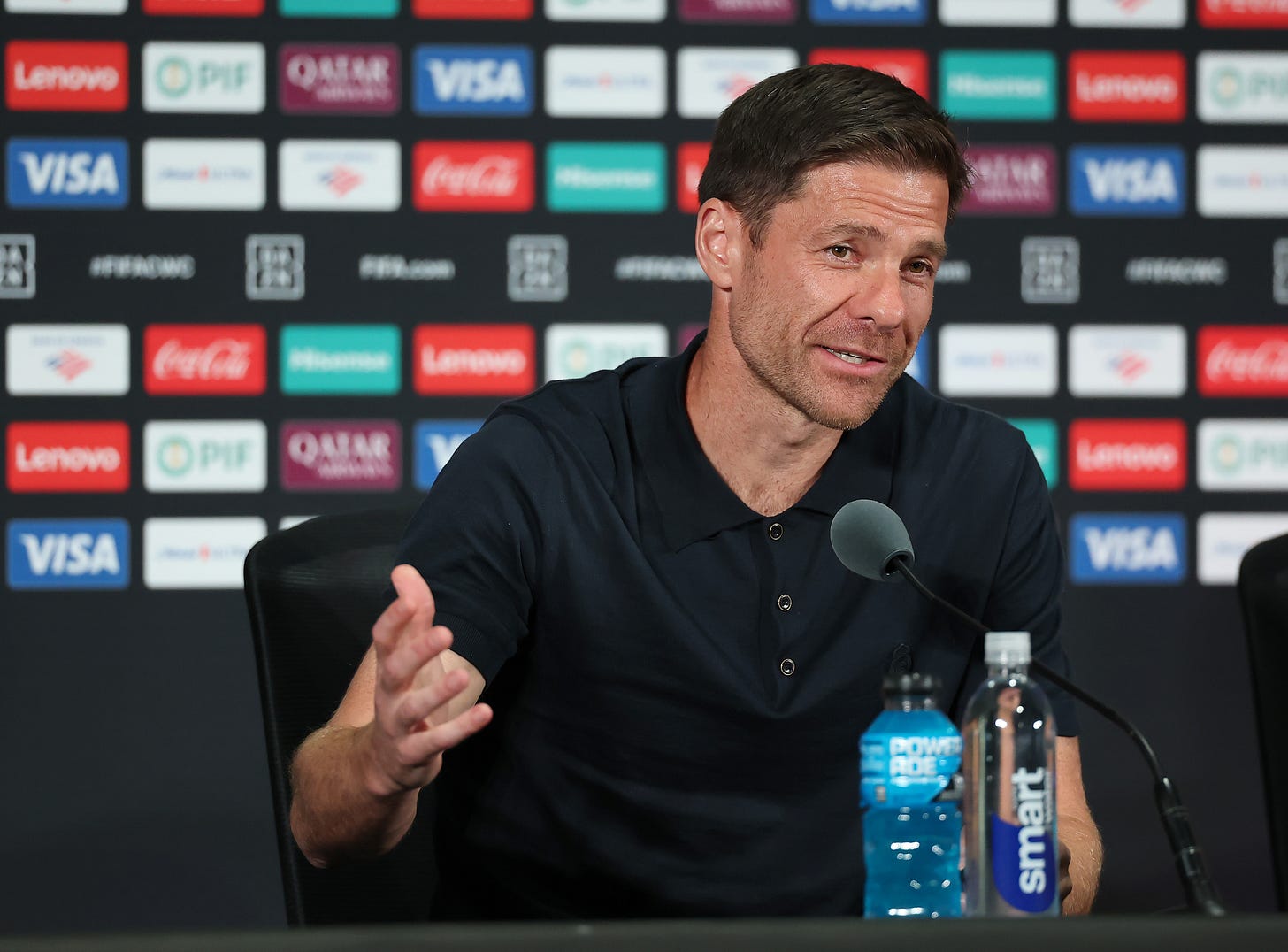Alonso charts a winning course at Real Madrid
The Spanish giants are just a game away from reaching the Club World Cup final
Xabi Alonso walked off the sun-drenched field this past Saturday at MetLife Stadium with a smile on his face. The new Real Madrid manager is passionate, but he doesn’t typically unleash his emotions in such a public way.
Calm, calculated and cerebral — just like during his playing days — the former midfield general let it all hang out against Borussia Dortmund in the quarterfinals of the FIFA Club World Cup. Alonso was doing plenty of fist pumping along the touchline after his side scored twice in the first half.
By game’s end, Real Madrid had escaped with a dramatic 3-2 win and a spot in the Club World Cup semifinals on Wednesday against defending European champions Paris Saint-Germain, coached by fellow Spaniard Luis Enrique.
“I’m doing what I need to be doing. Sometimes it goes well, sometimes it doesn’t,” Alonso admitted afterwards. “That’s what decision-making is all about. We need everyone. The bench members have to live it up, be connected for the decisive moments. We’re together 24 hours a day for three weeks. If you want coffee, have two cups. We’re in the semifinals!”
Alonso is no stranger to winning. This summer, he’s returned to Real Madrid, not as a player this time, but as the architect of its next era after Carlo Ancelotti left to coach Brazil. He’s got a very warm welcome bt Real Madrid fans at this tournament.
“Wherever we go, we receive the support of the Madridistas and we want people to support us and enjoy watching their team,” Alonso said of the fans across the United States who have come out to support his team. “We’re happy to deliver them the victory.”
Alonso was destined to be a soccer player. The son of Spanish midfielder Periko Alonso, his education began early, molded by a natural affinity for reading the game. After rising through the ranks at Real Sociedad, he made a name for himself in England with Liverpool, where he won the Champions League against AC Milan in an unforgettable 2005 final. Spells at Real Madrid and Bayern Munich followed, earning him a trove of domestic and international trophies, including two European Championships and the 2010 World Cup with Spain.
For those who watched Alonso closely, it was clear his future would someday be on the sidelines as a manager. Following his retirement in 2017, Alonso quietly began his coaching journey. He started humbly with Real Madrid's youth team before making waves with Real Sociedad B, where he led the reserve side to promotion to Spain’s Segunda Division.
It would be at German side Bayer Leverkusen where Alonso truly demonstrated his coaching brilliance. Taking over in 2022 with the club near the bottom of the Bundesliga, he transformed the club into a dynamic side that played with intensity and precision. By 2024, Leverkusen were Bundesliga champions for the first time in the club’s history and ended the season unbeaten — an astonishing feat that catapulted Alonso to the top of every major club's wish list.
When Real Madrid came calling this year, it felt like destiny. The club where Alonso once orchestrated games from the midfield handed him the reins. As manager, he embodies the same characteristics that defined him as a player: Tactical intelligence and an unwavering belief in playing beautiful soccer.
“In many ways, it reminds me of the training camps I had as a player, because many people at the club haven't changed, but now in a different role. The role of having to organize, make decisions and prepare things,” Alonso said. “But there are many things that don't change. It's managing players and people and establishing these relationships and bonds of trust that then allow you to build for the future. Spending a lot of time together is allowing us to accelerate that. You have breakfast, lunch and dinner with them.”
Alonso said playing what he called “an intense competition” like the Club World Cup in what would normally be the start of preseason could help team unity ahead of this coming season.
“We spend a lot of time together as a team,” he said, “and that allows us to strengthen relationships, which are so important.”
As far as tactics are concerned, Alonso said he’s flexible. Against Dortmund, he utilized a 4-3-1-2, but hasn’t been against the 3-4-3 or even a 3-2-5 when his team is on the attack.
“The system can be flexible. … Defining a formation is very static. Football forces you to do many things,” he said. “I don’t get hung up on saying this is my system and it’s immutable. I’m interested in the players interpreting it within our style of play.”
But former Real Madrid midfielder Claude Makelele said Alonso needs to be given time to succeed.
“The work of a coach is not for one, two or three months, it is for one or two years,” he said. “It’s time to let him work, to let him do things and, little by little, we will see the improvement.”





